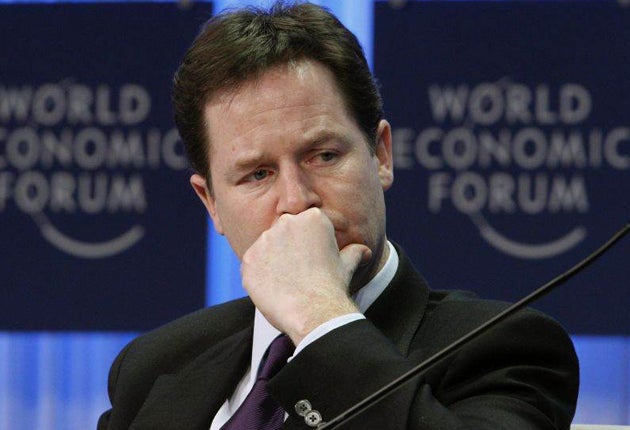Lib Dems to target Tory votes as Clegg sees his constituency slip away
Bold new strategy as banks deal becomes latest image problem

The Liberal Democrats will try to win the votes of "soft" Conservative supporters at the next general election after conceding they are unlikely to regain the backing of people who have already switched to Labour.
Confidential papers seen by The Independent suggest that Nick Clegg will reject calls by some Liberal Democrats for him to "tack left" to try to convince progressive voters that he is not "right-wing" after entering the Coalition with the Tories.
Instead, Mr Clegg will pitch to people who voted Tory in last year's general election, but believe the party is more right-wing than David Cameron. He will also target people who like the Liberal Democrats but did not bother to vote last May, trying to convince them his party would no longer be a "wasted vote" because it has become a credible party of government.
Yesterday Mr Clegg had more immediate problems to handle amid tension in his party over the Government's decision not to tax bankers' bonuses in return for a promise that lending to small firms would be boosted.
Lord Oakeshott of Seagrove Bay, who quit as a Liberal Democrat Treasury spokesman after condemning the agreement, blamed Mr Cameron for what he called a "weak, waffly" deal.
Vince Cable, the Liberal Democrat Business Secretary, rejected Tory calls to stop "banker bashing" and talked up the prospect of splitting the big banks' investment and high street arms. "We have got to keep the pressure up on the banks, particularly on lending," he said.
Mr Clegg's long-term strategy to detach "soft" Conservatives from Mr Cameron's party was discussed at a private meeting a week ago of Liberal Democrat Cabinet ministers and their advisers. It could cause some tensions between Mr Clegg and Mr Cameron.
Although the two leaders want the Coalition to maintain a united front until the election due in 2015, the Liberal Democrat plan is a clear signal that the party will then go its own way. Some Tories have called for an electoral pact between the Coalition partners or an informal agreement to encourage anti-Labour tactical voting, but the idea has not been endorsed by any Liberal Democrats.
Private polling among 2,000 people presented to last week's session will shape Mr Clegg's strategy to prevent a reduction in his ranks of 57 MPs in 2015. The number of people who say they would not vote Liberal Democrat under any circumstances has risen from 16 to 23 per cent since May. Party officials suspect most have switched to Labour or the Greens and are unlikely to be wooed back. These defections have caused the Liberal Democrats' slump in the opinion surveys but their private polling paints a more optimistic picture of the party's prospects in 2015.
Although the proportion of people who would "strongly consider" backing Mr Clegg's party dropped from 46 per cent last May to 37 per cent in December, officials were heartened that four in 10 voters were still "very much open to us" in the immediate aftermath of the party's damaging U-turn over university tuition fees.
Of the 37 per cent, 2 per cent say they always vote Liberal Democrat; 13 per cent say they would most likely vote for the party but may consider backing others and 19 per cent would consider supporting them equally among other parties.
Only 28 per cent of the Liberal Democrats' "strong considerers" voted for the party last May, while 26 per cent backed the Tories and 31 per cent did not vote. These two groups are now the third party's key targets.
The polling suggests that Mr Clegg's "trust" rating had plummeted. But while most people believe that he has compromised his values, only about one in 10 people think he has "sold out". People who have abandoned the Liberal Democrats now regard Mr Clegg and his party as too far to the right. Among the population as a whole, Mr Clegg and his party are seen as on the centre ground, with the Liberal Democrat leader a little to the right of his party. Ed Miliband is seen as to the left of Labour, while the Tories are seen as more right-wing than Mr Cameron.
This finding has reinforced Mr Clegg's determination to remain firmly in the centre ground. One ally who was present at the meeting said yesterday: "We must not tack left. We must be in the liberal centre. Some Lib Dems say we should pull left to show we are not Tories but won't help us win votes from the Tories."
* The European Union's financial services chief yesterday warned of a fresh crackdown on bonuses. Michel Barnier urged bank bosses to be careful when deciding to lavish big pay-outs on their "stars", or else the EU might beef up what bankers claim are already some of the toughest rules in the world.
Join our commenting forum
Join thought-provoking conversations, follow other Independent readers and see their replies
Comments
Bookmark popover
Removed from bookmarks